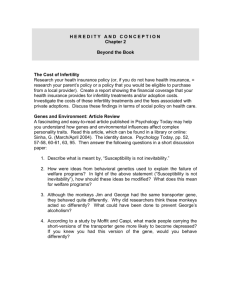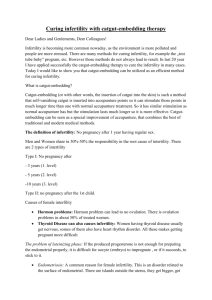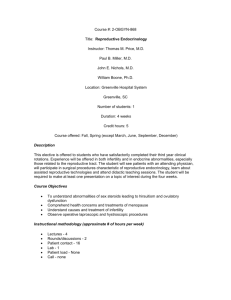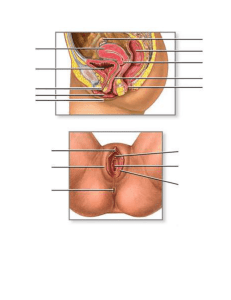Infertility Infertility refers to a male or female's complications in
advertisement
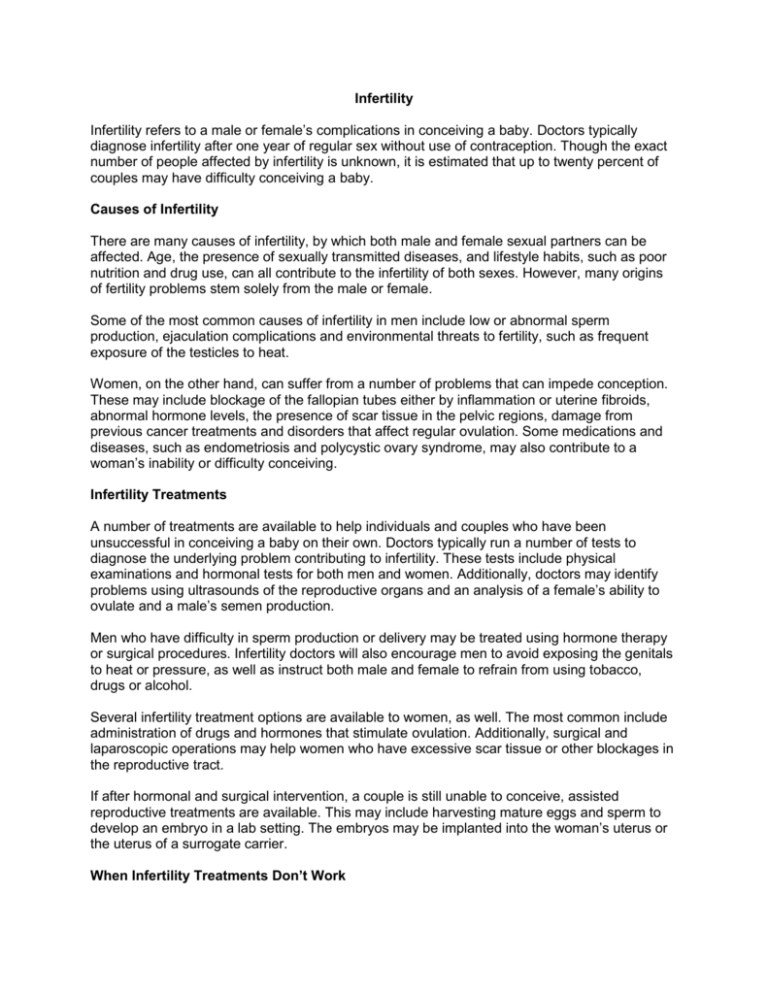
Infertility Infertility refers to a male or female’s complications in conceiving a baby. Doctors typically diagnose infertility after one year of regular sex without use of contraception. Though the exact number of people affected by infertility is unknown, it is estimated that up to twenty percent of couples may have difficulty conceiving a baby. Causes of Infertility There are many causes of infertility, by which both male and female sexual partners can be affected. Age, the presence of sexually transmitted diseases, and lifestyle habits, such as poor nutrition and drug use, can all contribute to the infertility of both sexes. However, many origins of fertility problems stem solely from the male or female. Some of the most common causes of infertility in men include low or abnormal sperm production, ejaculation complications and environmental threats to fertility, such as frequent exposure of the testicles to heat. Women, on the other hand, can suffer from a number of problems that can impede conception. These may include blockage of the fallopian tubes either by inflammation or uterine fibroids, abnormal hormone levels, the presence of scar tissue in the pelvic regions, damage from previous cancer treatments and disorders that affect regular ovulation. Some medications and diseases, such as endometriosis and polycystic ovary syndrome, may also contribute to a woman’s inability or difficulty conceiving. Infertility Treatments A number of treatments are available to help individuals and couples who have been unsuccessful in conceiving a baby on their own. Doctors typically run a number of tests to diagnose the underlying problem contributing to infertility. These tests include physical examinations and hormonal tests for both men and women. Additionally, doctors may identify problems using ultrasounds of the reproductive organs and an analysis of a female’s ability to ovulate and a male’s semen production. Men who have difficulty in sperm production or delivery may be treated using hormone therapy or surgical procedures. Infertility doctors will also encourage men to avoid exposing the genitals to heat or pressure, as well as instruct both male and female to refrain from using tobacco, drugs or alcohol. Several infertility treatment options are available to women, as well. The most common include administration of drugs and hormones that stimulate ovulation. Additionally, surgical and laparoscopic operations may help women who have excessive scar tissue or other blockages in the reproductive tract. If after hormonal and surgical intervention, a couple is still unable to conceive, assisted reproductive treatments are available. This may include harvesting mature eggs and sperm to develop an embryo in a lab setting. The embryos may be implanted into the woman’s uterus or the uterus of a surrogate carrier. When Infertility Treatments Don’t Work In some cases, infertility treatments don’t work. After all options have been exhausted, whether due to financial, emotional or timing factors, couples may find difficulty coping with the possibility of never having a biological child. Comfort may be found in the consolation of family and friends, as well as the support of a family counselor. Some couples also find fulfillment in adoption.
